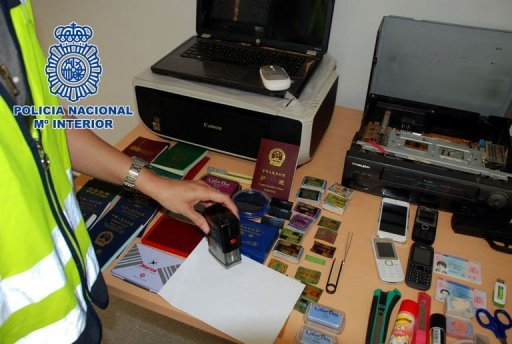Spanish and French police said they have dismantled a human trafficking ring that smuggled Chinese migrants into Europe and the United States, charging up to 50,000 euros per person.
A total of 75 suspects including two “main operatives” based in Barcelona were arrested, including 51 in Spain and 24 in France after a two-year joint investigation, a police statement said.
The traffickers charged 40,000 to 50,000 euros ($53,000 to $66,000) per person to provide “false identities and transport Chinese citizens to the United States and countries such as Spain, France, Greece, Italy, the United Kingdom, Ireland and Turkey,” the statement said.
In some cases the ring was involved in the sexual exploitation of migrants, it added.
Spanish police seized 81 fake passports from Asian countries such as Taiwan, South Korea, Malaysia, Japan, Hong Kong and Singapore.
The investigation into the ring, described as “complex”, began in July 2011.
The traffickers accompanied their clients all the way from China to Spain, “the last stop (serving as a) trampoline to the final destination, usually the United Kingdom or the United States,” it said.
The operatives, mainly from China and Malaysia, had the “complete confidence” of the ringleaders and were “thorough connaisseurs of the European airports and cities along the route of the transfers,” the statement said.
Once their mission was accomplished they would return home immediately, “in order to make it more difficult to track them,” police said.
Upon the migrants’ arrival in Barcelona, operatives of the trafficking ring would meet them and take them to safe houses before they embarked on the next leg of their journey.
The route taken from China, as well as the travel documents used, “changed constantly according to the successes and failures of previous trips… or in order to prevent discovery of the traffickers,” the statement said.
The migrants were given precise instructions on how to avoid detection at customs controls, such as trying to blend in with groups of tourists.
The two top suspects were arrested in Barcelona, while another 49 were picked up in Spanish airports including those of Barcelona, Madrid, Malaga and Mallorca, plus another 24 in France.
The 81 fake passports were found in two lodgings owned by the ring in Barcelona.
There police also found equipment for forging documents including portable computers, scanners, around 20 fake customs stamps and an electronic magnifier.
Police also provided pictures of a firearm, cellphones and wads of cash, both euros and yuan, that were seized in the operation.
The European Commission warned in a report issued in April that the problem of human trafficking was worsening across the bloc.
It signalled an 18 percent increase from 2008 to 2010 in identified and presumed victims of trafficking in the then 27-nation EU, with the total reaching 23,632.
More than half of the victims — 61 percent — were from EU nations, most often Romania and Bulgaria, with Nigeria and China as the most common countries of origin outside Europe.
In a 2010 report, the UN Office on Drugs and Crime described human trafficking as “one of the most lucrative illicit businesses in Europe”, estimating gains through sexual exploitation and forced labour alone at around 2.5 billion euros per year.

COMMENTS
Please let us know if you're having issues with commenting.